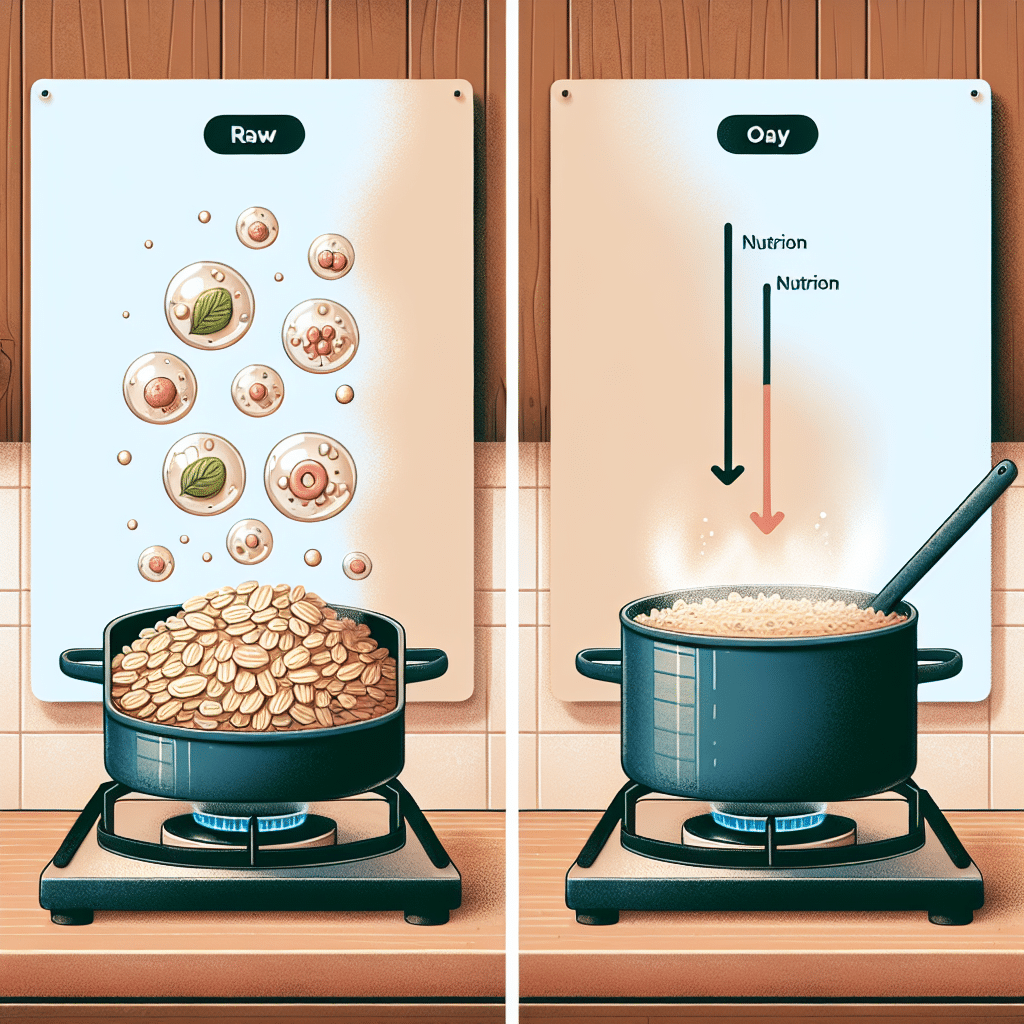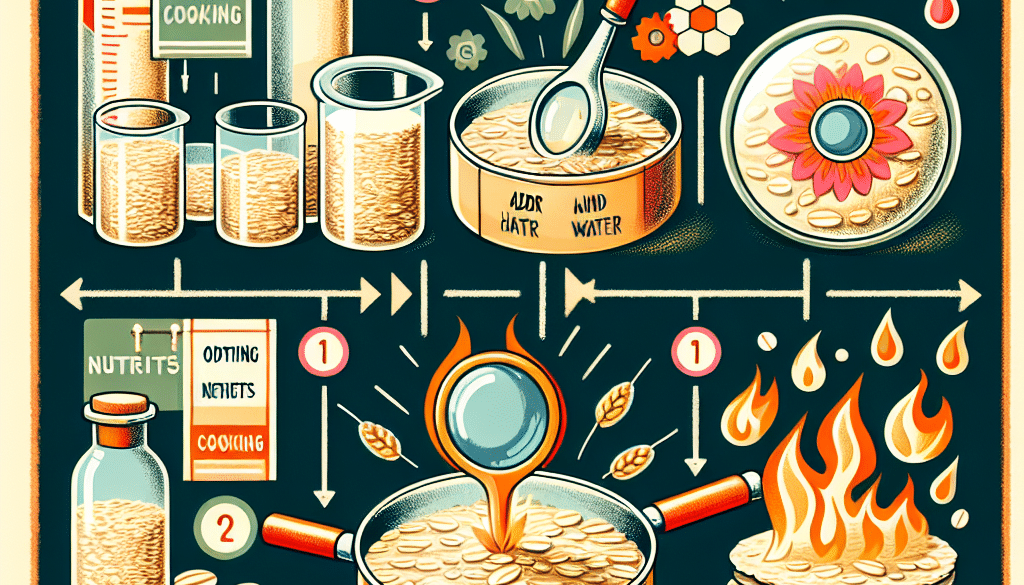Does Cooking Oats Destroy Nutrients?
-
Table of Contents
- Does Cooking Oats Destroy Nutrients? Unveiling the Facts
- The Nutritional Profile of Oats
- Understanding the Cooking Process
- Does Heat Affect Oat Nutrients?
- Comparing Cooking Methods
- Maximizing Nutrient Retention in Oats
- Case Studies and Research
- Conclusion: Balancing Cooking and Nutrition
- Enhance Your Diet with ETprotein’s Protein Products
Does Cooking Oats Destroy Nutrients? Unveiling the Facts

Oats are a staple in many health-conscious diets, revered for their nutritional benefits and versatility. However, a common concern among oat enthusiasts is whether the cooking process diminishes the nutritional value of this whole grain. This article delves into the science behind oat preparation and its impact on nutrient retention, providing a comprehensive understanding of how to maximize the health benefits of oats.
The Nutritional Profile of Oats
Oats are a nutrient-dense food, packed with essential vitamins, minerals, and bioactive compounds. They are particularly known for their high fiber content, including beta-glucan, which has been linked to lowering cholesterol levels and improving heart health. Oats also contain a good balance of protein, complex carbohydrates, and healthy fats, alongside a variety of micronutrients such as magnesium, phosphorus, zinc, iron, and B-vitamins.
Understanding the Cooking Process
Cooking is a method of food preparation that can alter the chemical structure of nutrients, sometimes enhancing their bioavailability or, conversely, leading to nutrient loss. The extent of nutrient preservation or destruction during cooking largely depends on the cooking method, duration, and temperature.
Does Heat Affect Oat Nutrients?
When it comes to oats, the impact of cooking on nutrient content is multifaceted. Heat can indeed cause the degradation of certain heat-sensitive vitamins, such as vitamin B1 (thiamine). However, the overall effect of cooking oats is not solely detrimental. Cooking can also reduce the presence of antinutrients—compounds that interfere with the absorption of nutrients—and make the grain’s nutrients more accessible to the body.
- Impact on Soluble Fiber: The soluble fiber beta-glucan in oats is not significantly affected by cooking. In fact, cooking can make beta-glucan more soluble, potentially enhancing its health benefits.
- Protein Quality: The protein in oats remains largely intact during cooking, although there may be minor denaturation. This change in structure does not necessarily reduce the protein’s nutritional value.
- Mineral Availability: Cooking can sometimes improve the bioavailability of minerals by breaking down phytates, which bind minerals and limit their absorption.
Comparing Cooking Methods
Different cooking methods can affect the nutrient content of oats to varying degrees. Here’s a look at some common methods:
- Boiling: Boiling oats in water is a traditional method that can lead to some loss of water-soluble nutrients into the cooking water. However, since the cooking water is typically consumed in oatmeal, these nutrients are not entirely lost.
- Steaming: Steaming oats may result in less nutrient loss compared to boiling, as there is minimal contact with water.
- Microwaving: Microwaving oats is a quick method that uses less water and shorter cooking times, potentially preserving more nutrients.
- Baking: Baking oats, as in granola or oat bars, may expose the oats to higher temperatures, but the dry heat does not leach out water-soluble nutrients.
Maximizing Nutrient Retention in Oats
To preserve the nutritional quality of oats, consider the following tips:
- Opt for shorter cooking times and lower temperatures where possible.
- Use cooking methods that retain the cooking liquid, such as making oatmeal or overnight oats.
- Combine oats with nutrient-dense toppings like fruits, nuts, and seeds to enhance the overall nutritional profile of your meal.
Case Studies and Research
Several studies have investigated the effects of cooking on oat nutrients. For instance, research published in the “Journal of Food Science and Technology” found that the antioxidant activity in oats remained stable after boiling for 30 minutes. Another study in the “Journal of Agricultural and Food Chemistry” reported that cooking oats did not significantly affect the dietary fiber content, including beta-glucan.
Conclusion: Balancing Cooking and Nutrition
In conclusion, while cooking oats may lead to some loss of certain nutrients, it does not destroy their overall nutritional value. The benefits of cooking, such as increased palatability and digestibility, often outweigh the minimal nutrient losses. By choosing appropriate cooking methods and combining oats with other healthful ingredients, one can enjoy a nutritious and delicious oat-based meal.
Enhance Your Diet with ETprotein’s Protein Products
If you’re looking to boost the protein content of your oat dishes or any other meal, consider incorporating ETprotein’s high-quality protein products. Their extensive range of organic and allergen-free proteins, including rice, pea, and seed-based options, can complement your dietary needs while maintaining a commitment to health and wellness.
About ETprotein:
ETprotein, a reputable protein and L-(+)-Ergothioneine (EGT) Chinese factory manufacturer and supplier, is renowned for producing, stocking, exporting, and delivering the highest quality organic bulk vegan proteins and L-(+)-Ergothioneine. They include Organic rice protein, clear rice protein, pea protein, clear pea protein, watermelon seed protein, pumpkin seed protein, sunflower seed protein, mung bean protein, peanut protein, and L-(+)-Ergothioneine EGT Pharmaceutical grade, L-(+)-Ergothioneine EGT food grade, L-(+)-Ergothioneine EGT cosmetic grade, L-(+)-Ergothioneine EGT reference grade and L-(+)-Ergothioneine EGT standard. Their offerings, characterized by a neutral taste, non-GMO, allergen-free attributes, with L-(+)-Ergothioneine purity over 98%, 99%, cater to a diverse range of industries. They serve nutraceutical, pharmaceutical, cosmeceutical, veterinary, as well as food and beverage finished product distributors, traders, and manufacturers across Europe, USA, Canada, Australia, Thailand, Japan, Korea, Brazil, and Chile, among others.
ETprotein specialization includes exporting and delivering tailor-made protein powder and finished nutritional supplements. Their extensive product range covers sectors like Food and Beverage, Sports Nutrition, Weight Management, Dietary Supplements, Health and Wellness Products, and Infant Formula, ensuring comprehensive solutions to meet all your protein needs.
As a trusted company by leading global food and beverage brands and Fortune 500 companies, ETprotein reinforces China’s reputation in the global arena. For more information or to sample their products, please contact them and email sales(at)ETprotein.com today.












